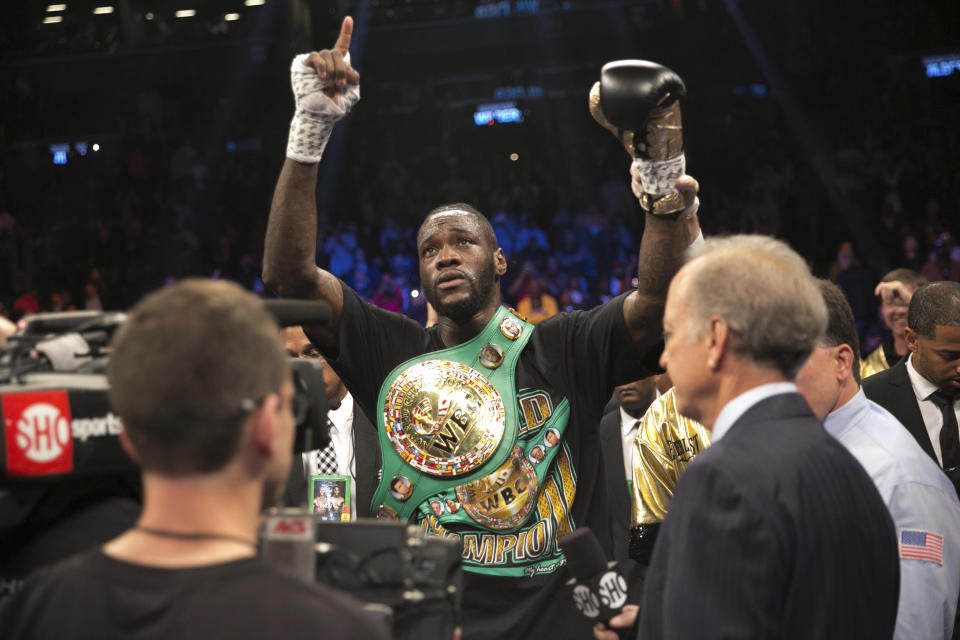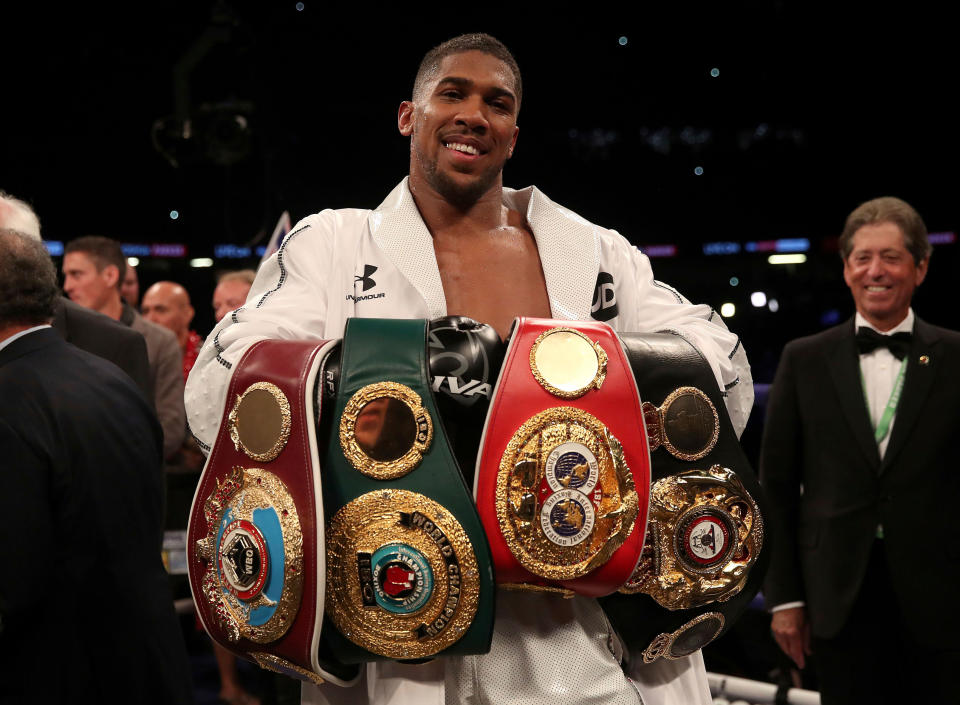Boxing too stuck in its ways to organize Deontay Wilder-Anthony Joshua heavyweight showdown

Boxing is so often like a bad movie, a thriller that builds to a climax and then just fizzles at the end.
This time, of course, boxing fans are left with the disappointment of not having a heavyweight unification bout between Anthony Joshua, the IBF-WBA-WBO champion, and Deontay Wilder, the WBC king.
Combined, they’re 61-0 with 59 knockouts and they own all of the major heavyweight belts. Each is also vulnerable enough to make a match between them thrilling and highly unpredictable.
When Wilder made a remarkable comeback on March 3 in Brooklyn to stop Luis Ortiz, he called out Joshua, and it seemed that, finally, the fight the fans wanted to see would be made in a timely manner.
Four weeks later, Joshua routed Joseph Parker and dared Wilder to come to the U.K. to fight him. Wilder immediately said yes.
This is boxing, though, and when we hit the denouement, the ending is predictable: Joshua winds up fighting someone else, and soon Wilder will fight someone else. Harsh words are exchanged and boxing makes itself look like what it has been for so long: a cesspool of greed and incompetence with people who can’t get out of their own way long enough to rake in tens of millions of dollars, let alone do something good for the sport.
When one looks carefully at this, it is hardly surprising the fight hasn’t been made. To start with, who does one negotiate with? Wilder has three managers – Al Haymon, Shelly Finkel and Jay Deas – and a promoter, the great Lou DiBella.
On the Joshua side, does one negotiate with promoter Eddie Hearn, or his father, Barry Hearn? At one point or another, all of them have been involved to some degree.
It was hard to figure for the people involved, let alone for an outsider to decipher, and there were times when parallel negotiations were ongoing.
So Joshua will fight Alexander Povetkin on Sept. 15 and Wilder will likely meet Dominic Breazeale. It’s disappointing, but if there were a logical reason behind it, it could be accepted.
It doesn’t appear that either side could give you a logical reason. Wilder went on a profane Twitter rant on Tuesday, lambasting Joshua for failing to fight him.
In one tweet, Wilder wrote, “I’m embarrassed for them. He’s a true coward plain and simple.”
Joshua is not a coward and he would not have become an Olympic gold medalist or a unified heavyweight champion were he, in fact, afraid.

That said, the fighters themselves have had all along the power to make this fight. Yes, Povetkin is the mandatory for Joshua’s WBA belt, and Wilder has had a deal in place for several months to fight Breazeale, but those things don’t much matter.
If the WBA had stripped Joshua for not defending against Povetkin, it would have hurt the WBA far more than either Joshua or Wilder. The winner of the Joshua-Wilder fight would have been the widely recognized champion, and not the holder of a sanctioning body belt that too often in history has been for sale to the highest bidder.
Had Joshua and Wilder each come out and said unambiguously that they demanded their representatives hammer out a deal to fight each other and to not consider any other options, the fight would be happening.
When fights like these aren’t made, it damages the entire sport. Boxing is the only sport that repeatedly fails to offer its biggest and best fights in a timely manner to its customers.
There was a time, as recently as in the 1950s, when boxing was one of the big three sports in the U.S., along with baseball and horse racing. Those days are long gone, though, and with no infrastructure in place to regulate the sport, it’s never going to regain its stature.
Oh, there are always good fights, because the athletes are as fearless as they come and regularly pour their hearts out in the ring. And there are plenty of folks who are trying to do the right thing in order to advance the cause.
Most boxing people – and by boxing people, I largely mean managers and promoters – are only in it for the short term and don’t have a long-term business plan. Top Rank’s recent deal with ESPN is a step in the right direction in terms of treating boxing like an ongoing business concern instead of a series of one-off events, but ask yourself this question:
When will WBO welterweight champion Terence Crawford, who is with Top Rank, fight IBF champion Errol Spence Jr., who is with the Premier Boxing Champions? Though it is one of the mega-fights that could be made, most in the industry believe it won’t occur until late 2019 at the earliest or even into 2020.
It’s the same old, same old in boxing.
Wilder and Joshua aren’t going to fight each other next, though that’s what fans were led to believe after each fought – and won –in the same month and each called the other out.
They’re depriving their customers of what they want, and that’s no way to run a business, but it’s boxing.
It’s what they do. And if you don’t believe it, go back and look at the history for at least the last 50 years.
It’s sad, but it’s why boxing has struggled to regain relevance in the mainstream for so long.
More from Yahoo Sports:
• Germany eliminated from World Cup with loss to South Korea
• MLB podcast: Archie Bradley reveals he pooped his pants during a game
• Human body discovered in beer cooler at Atlanta Braves’ Suntrust Park
• Wendell Carter’s parents still mad at Duke over ‘shady’ recruiting tactics


